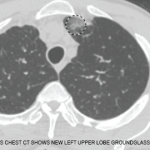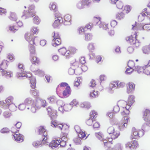Notably, ADVOCATE excluded patients who required invasive pulmonary ventilation support. However, this analysis mirrors the analysis of patients enrolled in ADVOCATE with glomerulonephritis, who also respond remarkably well to treatment with avacopan in place of glucocorticoids. This post-hoc analysis provides additional reassurance that avacopan is an appropriate substitute for oral glucocorticoids in patients who present with pulmonary-renal syndrome.
4. Relapse on Dialysis
Abstract 2382: Lee et al.6
Although outcomes among patients with ANCA-associated glomerulonephritis have improved dramatically with modern therapeutic strategies, many patients will eventually require renal replacement therapy. After hemodialysis is initiated, disease activity among patients with ANCA-associated glomerulonephritis often declines substantially.
This retrospective review examined this premise in 38 Korean patients, most of whom (92.1%) had MPA. Twelve of these patients relapsed a mean of 60 months following initiation of dialysis. These relapses included nine patients with DAH, and two patients with worsening interstitial lung disease. In multivariate analysis, prior episodes of DAH (hazard ratio 5.51, 95% CI: 1.57–19.3) and mean glucocorticoid dose (hazard ratio 1.38, 95% CI: 1.16–1.64) were significantly associated with relapse.
Case reports of recurrent vasculitis following renal replacement therapy are not new. However, this report implies that recurrence may occur in almost 25% of patients with MPA who are on dialysis. The authors posit that Asian patients may be at higher risk of relapse in this scenario; the specific protocol used for immunosuppression may also impact long-term risk of recurrence. For now, it seems prudent to monitor patients with MPA who are on dialysis carefully while tapering immunosuppression, particularly patients who have had prior episodes of pulmonary hemorrhage or have required high doses of glucocorticoids for remission induction.
5. Intensified B Cell Depletion Therapy
Abstract 0690: Roccatello et al.7
Rituximab tremendously improved the safety of remission induction regimens for patients with ANCA-associated vasculitis. However, remission induction with rituximab continues to require several months of glucocorticoid therapy, which drives many of the treatment-associated adverse events experienced by patients.
In this study, investigators compared the efficacy of an intensified B cell depletion therapy to conventional therapy. All of the patients enrolled in this study had renal failure due to ANCA-associated glomerulonephritis. Fifteen patients were treated with the intensified regimen, which included rituximab, cyclophosphamide and methylprednisolone pulses, but not oral glucocorticoids or other immunosuppressants. Ten patients were treated with oral cyclophosphamide and glucocorticoids followed by azathioprine. Patients in both groups who presented with alveolar hemorrhage, over 50% crescents on renal biopsy or dialysis dependence also received plasma exchange.



